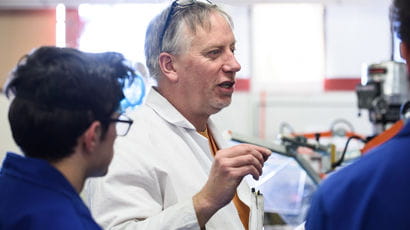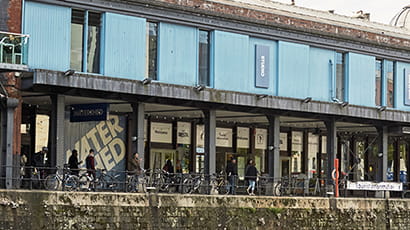AI to help people with type 2 diabetes manage their health

A Bristol-based team funded by the National Institute for Health and Care Research (NIHR) is developing a ground-breaking AI system designed with patients and their needs at its heart, to support people with type 2 diabetes in taking control of their health.
Structured diabetes education is a critical component of national efforts to improve health outcomes for people with the condition. The new software named ROMI (Relational Online Motivational Intervention) will deliver just that by providing patients with personalised accessible advice and support.
ROMI is a conversational AI that can deliver educational content – either verbally, as a text or as a graphic. Health care professionals and patients, including those from under-served communities which research shows have a higher prevalence of type 2 diabetes, will be involved in the design process from the start.
The team behind ROMI is made up of researchers from the University of the West of England (UWE Bristol) and the NIHR Bristol Biomedical Research Centre (NIHR Bristol BRC), and Elzware, a technology company that has been developing conversational AI since 2002.
Elzware has been awarded £134,000 from the NIHR for a year, to develop ROMI. The kind of AI being offered by Elzware avoids the pitfalls of systems like ChatGPT, making it safe for medical use.
New generative AI systems like ChatGPT represent a huge leap in the capabilities of machine-learning systems. However, in a health context, they are hard to make totally reliable. Also, their carbon footprint is very high. An older form, so called symbolic AI, is more reliable, but less flexible. Elzware’s approach is a hybrid of the two methods making it highly scalable with a reduced carbon footprint.
According to Diabetes UK, 3.6 million people in the UK are diagnosed with type 2 diabetes while another 13.6 million are at increased risk of developing it. This means that it’s becoming harder for patients to get the support they need. The NHS is looking for digital solutions to make diabetes care and support more accessible. Encouraging and educating patients on how to manage their condition can be difficult. ROMI aims to be an easy-to-use tool that is accessible whenever the patient needs it.
ROMI will be co-designed by people who have type 2 diabetes, healthcare professionals, researchers and Elzware’s technical team. Experts in patient and public involvement (PPI) will ensure that people with type 2 diabetes are represented at every stage of the project.
This approach will let the researchers understand what content users would find most helpful and put their needs at the centre of the development process. At the same time the healthcare professionals will input ideas of how to empower patients to be the expert in their own self-management. The team will then aim to trial ROMI among their target population to assess how effective it is at providing patients with health-improving advice.
The ROMI team includes researchers from the NIHR Bristol BRC, the Digital Cultures Research Centre at the University of the West of England, Aston University in Birmingham and the local NHS. As well as technical expertise, the team has PPI specialists, a psychologist, a diabetologist and a dietician.
Dr Andy Gibson, Associate Professor at UWE Bristol and PPI lead for the project, said: “I am really excited to have the opportunity to work with people with type 2 diabetes to create an AI system that is people driven rather than data driven.”
Dr Duane Mellor, registered dietician and Associate Dean for Public Engagement at Aston University, Birmingham, said: “It is great to be involved in this project as it will take the voices of people living with type 2 diabetes to understand what they need to know about food and diabetes and then build it into an AI system that adapts to the types of food their family and community eat and enjoy.”
Phil D Hall, principal investigator and Conversational AI Architect, said: “At a time when every news story about artificial intelligence seems to be apocalyptic, our project is doing things differently.”
The team
The principal investigator is Phil D Hall of Elzware Ltd. His company has 20 plus years’ experience in building compelling conversational systems.
The PPI team will be led by Associate Professor Andy Gibson of the University of the West of England and the NIHR Bristol BRC. Andy is a recognised national leader in the development of PPI methods. Dr Mari-Rose Kennedy will organise the PPI events.
Dr Duane Mellor, Associate Dean for Public Engagement in the College of Health and Life Science at Aston University, Birmingham, is a double award-winning registered dietitian and science communicator with a special interest in supporting people living with diabetes.
Dr Faisal Hasan is a Consultant in Diabetes and Endocrinology at Southmead Hospital. He will advise on clinical best practice.
Programme Director will be Rik Lander, who has had a long career making interactive and participatory media. He is a part-time Senior Lecture in Interface and Experience Design at the University of the West of England and is a member of the Digital Cultures Research Centre. His role is to make sure that ROMI is compelling for users so that they keep using it, leading to health benefits.
Dr Michelle Griffiths will act as Research Associate, developing the theoretical basis of our approach. The project will be managed by Dr Elanor Hinton, drawing upon over 16 years of postdoctoral research experience.
Related news

18 December 2025
UWE Bristol professor appointed National Institute for Health and Care Excellence CEO
Jonathan Benger CBE, Professor of Emergency Care at UWE Bristol, has been appointed as the new chief executive officer of the National Institute for Health and Care Excellence (NICE).

17 December 2025
Findings revealed from first UK study into experiences of mothers who are survivors of rape pregnancy
UWE Bristol academics have revealed the findings of the first UK-based study of the experiences of mothers who are survivors of rape pregnancy.

11 December 2025
Social media influencer work is far more demanding than it looks, research finds
A study exploring the mental health impacts of social media influencer work has revealed that life online is far more demanding than it appears.

25 November 2025
UWE Bristol experts join film Q&A exploring music and melodrama
Academics will take part in the Cary Comes Home Festival, with a post-screening Q&A exploring music, melodrama and emotional storytelling in classic cinema.

17 November 2025
Urgent reform needed to support ambulance-delivered end of life care, study finds
More than three quarters (78 per cent) of paramedics sometimes fear doing the wrong thing when caring for people in the last year of life, new research has found.

13 November 2025
Bristol’s screen industry experiences “boom-and-bust cycle” after post-pandemic recovery, new research from UWE Bristol finds
New research from UWE Bristol provides detailed insight into Bristol's screen sector.

13 November 2025
New AI research to revolutionise animal welfare
A UWE Bristol research project will combine behavioural science and AI to create technology that understands not only what animals do, but how they feel.

10 November 2025
Lessons from Low Traffic Neighbourhoods will drive better public engagement, study finds
Lessons from Low Traffic Neighbourhoods have informed a new toolkit to improve engagement with the public on challenging local street issues.

06 November 2025
First-of-its-kind study aims to help more people spend their final days at home
A new study will explore how architectural design could support end-of-life care in domestic settings.

29 October 2025
UWE Bristol academic unveils breakthrough in energy-efficient AI at NATO science forum
Dr Jonathan Lancelot has developed a new form of AI that could transform how intelligent machines operate in space, defence, and remote environments.

15 October 2025
UK food needs radical transformation on scale not seen since Second World War, new report finds
A new report from the Agri-Food for Net Zero Network+ finds urgent action on food is needed if the UK is to reboot its flagging economy, save the NHS billions, ensure national food security, and meet climate commitments.

07 October 2025
Academic playing role in project to find hidden graves in Mexico using drone technology
A UWE Bristol lecturer is playing a part in a project using drone technology to locate concealed graves in Mexico.
You may also be interested in

Media enquiries
Enquiries related to news releases and press and contacts for the media team.

Find an expert
Media contacts are invited to check out the vast range of subjects where UWE Bristol can offer up expert commentary.

Digital Cultures Research Centre (DCRC)
The Digital Cultures Research Centre (DCRC) is a loose-knit, collaborative and anti-disciplinary network of researchers distributed across UWE Bristol.






